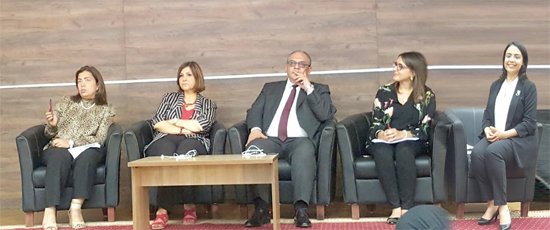African news : breaking news, features, analysis

Egypt committed to empowerment of women
Egypt is the first country globally to launch its national women strategy 2030, which is aligned with the Sustainable Development Goals (SDGs).
This confirms the country’s commitment to achieving the empowerment of Egyptian women.
Advertisement
The National Strategy for the Empowerment of Women 2030 was thus adopted by the President of Egypt Abdel Fattah El-Sisi in 2017.
The strategy has 34 SDG indicators and is comprised of four main pillars, namely the Political empowerment and leadership, Economic Empowerment, Social Empowerment and Protection.
Year of Egyptian Women
“In a historical precedent, President El-Sisi, announced 2017 as “The Year of Egyptian Women” and described expediting steps towards the empowerment of women, in addition to safeguarding their constitutional rights as a national duty.
The strong political will had created momentum and space that had enabled stakeholders, including the youth, academic institutions, legislators, religious leaders, rural woman and many others to advocate for and commit to the empowerment of women and girls at many levels.
As part of a two-week training workshop for about 40 senior journalists from Africa on “Media and Sustainable Development in Cairo, Egypt recently, there was a panel discussion with officials at the National Council on Women (NCW).
Public opinion
In her presentation, Miss Azza Abdelhai Sayed of the NCW said results of public opinion polls reflected an improvement in the values and perceptions of Egyptians regarding appointing women into leadership positions between 2014 and 2018.
In 2014, she said the percentage of Egyptians who believed that a woman was capable of becoming a prime minister, was 43 per cent and this increased to 54 per cent in 2018, while 42 per cent believed that women were capable of becoming governors in 2014 and this shot up to 62 per cent in 2018.
Miss Sayed noted that there were 89 women parliamentarians, increasing the percentage of women in the Egyptian Parliament from two per cent in 2013 to 15 per cent in 2018.
This, she noted, was the highest ever women representation in Parliament, while there were eight women ministers in the Egyptian cabinet, increasing the percentage of women ministers in the cabinet from six per cent in 2015 to 20 per cent in 2017 and to 25 per cent in 2018. The percentage of deputy ministers also increased from 17 in 2017 to 27 in 2018.
Local Councils
About 13,500 women are expected in the upcoming local councils, she noted, saying that this represents 25 per cent, the highest ever quota for wowmen in local councils.
In 2014, she said a woman was appointed advisor on National Security to the President, while a disabled woman and a rural woman were appointed to the Board of the NCW.
She said there three million beneficiaries of the Micro, Small and Medium Enterprises (MSMEs), out of which 70 per cent were women up till 2018, representing 2,100,000 women.
Miss Sayed also disclosed that the percentage of women holding bank accounts had increased from nine per cent in 2015 to 27 per cent in 2017, 44.5 per cent of women working in government agencies.
She announced that tthe Inheritance Law (Law 219, 2017), had been amended to impose stricter sanctions on those who withhold the inheritance from whoever had the right to such inheritance, which will have great impact on women.
The Manager of the Complaints Office, Ms Amal Tawfik said they assisted women who needed legal advice, adding that her unit handles violence, alimony, abuse, harassment and discrimination issues.
Miss Dina El-Serafy, an International Cooperation Specialist said her unit, which is the media department, prepares press restatements on issues or policies on daily basis to support the NCW.




